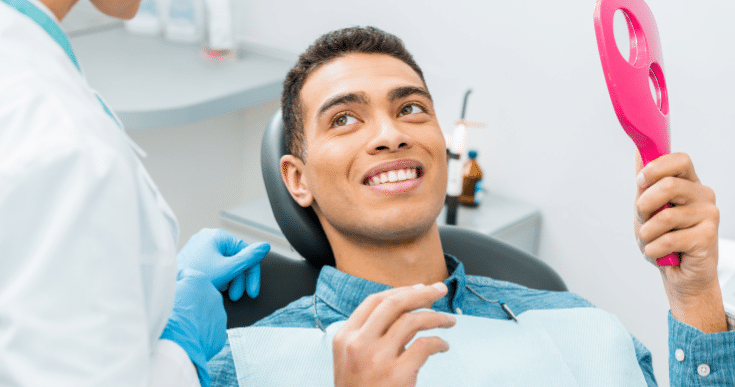
Hard brushing might seem like a quick fix for a cleaner mouth, but it can cause more harm than good. While many believe applying extra force can scrub away plaque and stains more effectively, your gums and teeth don’t respond well to this level of intensity. Let’s explore why hard brushing is harmful and explore safer alternatives to keep your smile bright without risking long-term damage.
Why Hard Brushing Isn’t the Answer?
It’s easy to think that the harder you brush, the cleaner your teeth will be. Unfortunately, this approach can lead to sensitive teeth, irritated gums, and enamel wear. Our teeth are coated with a protective layer of enamel that acts as a shield. Brushing too hard slowly wears down this enamel, leaving teeth vulnerable to decay, sensitivity, and discoloration.
Your gums can also suffer. Applying too much pressure can cause the gums to recede, exposing the root surfaces of your teeth. This not only makes teeth look longer and uneven but also increases sensitivity and increases the risk of gum disease.
The Importance of Gentle Brushing
You need to remember that brushing is not about pressure but technique. Gentle brushing with a soft-bristled toothbrush is more effective in removing plaque and bacteria while protecting your gums and enamel. Think of your gums and teeth as delicate surfaces. You wouldn’t scrub fragile items like fine china with brute force; the same rule applies to your teeth.
Dentists recommend using a toothbrush with soft bristles, angling it at a 45-degree angle to your gums. This method lets you clean the area where your teeth meet the gums without applying unnecessary pressure. The key is consistency, not strength.
How to Tell If You’re Brushing Too Hard
So, how do you know if you’re being too aggressive? Here are a few telltale signs:
1. Frayed Toothbrush Bristles—If your toothbrush bristles start splaying out after a few weeks, that’s a sign you’re pressing too hard.
2. Gum Recession—If your gums are pulling away from your teeth, this could be due to the excessive force you’re using.
3. Tooth Sensitivity—If you’re noticing increased sensitivity to hot or cold foods and drinks, your enamel may be thinning due to over brushing.
If you’re experiencing any of these issues, it’s time to reassess your brushing habits.
Hard Brushing and Tooth Enamel
Tooth enamel is the hardest substance in the human body, yet it’s still vulnerable to damage from improper brushing. Brutal brushing acts like sandpaper, slowly wearing down the enamel, which can’t regenerate once lost. Over time, this can lead to thinner enamel and a higher risk of cavities.
You might think whitening toothpaste or gritty products help clean better, but these can worsen the problem. Combined with hard brushing, these abrasive products can strip away enamel even faster. Instead, opt for non-abrasive toothpaste formulas designed for daily use.
What About Electric Toothbrushes?
Many people turn to electric toothbrushes for more efficient cleaning. The good news is that electric toothbrushes can be a great option, but only when used correctly. One of their advantages is that they often have pressure sensors that alert you when you’re brushing too hard. These devices do most of the work for you, so there’s no need to push down. Simply guide the brush along your teeth, letting the rotating bristles do the rest.
However, the same rules apply—if you’re pressing too hard, even with an electric toothbrush, you risk harming your teeth and gums. Choose a model with soft bristles and a gentle setting for the best results.
Healthier Brushing Habits for a Lasting Smile
Developing healthier brushing habits is crucial to protecting your teeth and gums for the long haul. Here are some tips to ensure you’re brushing the right way:
1. Use Soft Bristles: Always opt for a toothbrush with soft bristles. Medium and stiff bristles may seem appealing but do more harm than good.
2. Follow the Two-Minute Rule: Brushing should last for two minutes. Set a timer or listen to a song while brushing to ensure you give your teeth enough attention without overdoing it.
3. Let the Brush Do the Work: Whether you’re using a manual or electric toothbrush, applying heavy pressure is unnecessary. Let the bristles gently clean your teeth with circular motions.
4. Replace Your Brush Regularly: Worn-out bristles can’t clean effectively and may cause more damage. If the bristles are frayed, replace your toothbrush every three to four months or sooner.
5. Mind Your Gum Line: When brushing, aim for the area where your teeth meet the gums. This area is often neglected but essential in preventing gum disease and maintaining oral health.
6. Don’t Rush: Brushing too quickly can cause you to miss important spots. Take time to cover all areas of your mouth, focusing on each tooth individually.
The Role of Diet in Protecting Your Teeth
While proper brushing techniques are essential, your diet also plays a massive role in protecting your teeth. Foods high in sugar and acids, like soda and candy, can weaken enamel over time. Drinking water after meals and snacking on crunchy fruits and vegetables can help clean your teeth and promote saliva production, which naturally fights bacteria.
Pair a healthy diet with gentle brushing, and you’ll be well on your way to maintaining a strong, healthy smile.
Is hard brushing harmful? Absolutely. While it may seem like you’re doing your mouth a favor, hard brushing can negatively affect your teeth and gums. Gentle, consistent dental care under the guidance of licensed dentists paired with the proper brushing tools and techniques is the key to oral health. Making a few simple changes can protect your teeth from unnecessary damage and keep your smile bright for years.
Adopt a gentler approach to preserve your enamel, maintain healthier gums, and reduce teeth sensitivity to avoid costly dental procedures. So, the next time you reach for your toothbrush, remember: it’s all about technique, not force.




